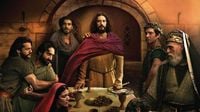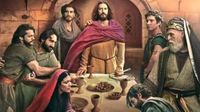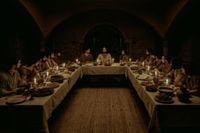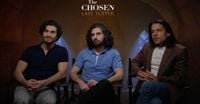The popular Christian series The Chosen continues to do well at the box office, holding its own against recent Hollywood blockbusters such as Snow White and A Minecraft Movie. Now in its fifth season, Part 1 of The Chosen: Last Supper — the first two episodes — has become the highest-grossing installment of the series, raking in a little over $19 million in theaters at the time of publishing. Part 2 — episodes 3 through 5 — of the fifth season recently hit the $10 million mark, and Part 3, which is episodes 6 through 8, was released April 11 and grossed $5.8 million during its opening weekend.
In an interview with CNA, Dallas Jenkins — creator, writer and director of The Chosen — shared what inspired his vision of the Last Supper depicted in Season 5, given many different presentations of this historic event. “We do it ‘The Chosen’ way, which is we take stories that are famous… maybe they have been portrayed in stained-glass windows or as paintings in the case of the Last Supper, one of the most famous paintings of all time … and we’re going to reveal the humanity of it,” he told CNA during a press junket in Dallas on March 19.
“At the beginning of the Last Supper, it was 13 brothers who were very, very close to each other and who loved each other deeply being told by one of them ‘I’m not going to be with you much longer’ and saying some extraordinarily important things that they don’t quite understand and so they’re trying to make sense of it,” Jenkins said. “So the humanization of a story that actually was human but that we don’t often look at it that way is an important part of how we portrayed it and one that, almost because of the fame of this part of the story, the fame of the Last Supper, it’s easy to distance yourself from it emotionally. And so, I think we’re trying to bring you back into what it would’ve been like to be in that room.”
One of the disciples who begins to understand what Jesus is telling them in Season 5 is John. Actor George Xanthis, who portrays John the Apostle, told CNA how he has seen his character go from “thunder to love” and how viewers are “following him on this journey” from “Son of Thunder,” as Jesus jokingly calls John and his brother James, to becoming “the beloved disciple.” Xanthis shared that at the beginning of Season 5, John is “ready to listen” but “he doesn’t know what he’s supposed to be listening for.” He added that while Mary Magaldene catches the “bug” of understanding what Jesus is telling them in Season 4, “what Season 5 shows is John catches that bug and he catches it off Mary, which is a lovely moment because it’s a foreshadowing of where they’re both going to end up. So, this is kind of John beginning to have that insider’s ear.”
“I would say that he’s starting to pay attention and he’s sticking very, very close to Jesus as he does,” he said. The actor pointed out how Jenkins frequently reminded the cast that while they may personally know what happens in the end, at the time, the disciples didn’t know how things were going to end. Raised in a Greek Orthodox family knowing the Gospels, Xanthis said he had to “wrestle with that — because I knew what was happening, [so] I’m like, ‘How could the disciples not see this?’”
“So, even as John is beginning to catch on to it, it’s also that he doesn’t believe that it’s going to happen at the end of the week,” he added.
In terms of what he hopes viewers will take away from this season as they themselves are experiencing Holy Week, Jenkins said: “I’m hoping viewers watch this going, ‘When I don’t understand something or someone, can I still trust and follow? Can I still have faith?’”
“Judas didn’t understand and rejected,” Xanthis explained. “The religious leaders didn’t understand and rejected. We have a tendency to still do that today — things I don’t understand, people I don’t understand, I’m going to reject and I’m going to be secure in my own rightness because confusion is not something I can handle. And I think we see in Season 5, more than ever, what it’s like to follow and trust even when you don’t fully understand.”
Actor Paras Patel, who portrays Matthew, also shared his hopes for viewers this season. “A recurring theme with the show is that there is light after darkness and so we are heading into the darkness but know that there is light coming after,” Patel shared. “This is going to be a hard season to watch just because we know what’s to come and what’s happening, but I think at the end of the day I just feel like people leave feeling a little bit of hope…you’ll feel a lot, but also just feel rejuvenated and have some strength and hope.”
The Chosen is one of several faith-based productions performing well in theaters and on streaming platforms currently. Angel Studios’ King of Kings recently set a new record for a biblical animated film with a projected $19 million domestic debut over its opening weekend. The new series House of David earned the No. 1 spot on Prime Video’s Top 10 Shows List after its season finale aired on April 3 and drew 22 million viewers in its first 17 days on the streaming platform.
Season 5 of The Chosen is vivid: bright fabrics and flowers, fountains and palms, glugs of olive oil and wine, the gleam and clatter of silver pieces, and the blood of butchered animals pooling in straw. The snap of unleavened bread. The flicker of candlelight. The scent of perfume, bought at great price and poured with abandon over Jesus’ feet. Some of the Roman costumes look chintzy. There’s a fog machine in the Garden of Gethsemane. But these misses are the exception, not the rule. It’s a very pretty show.
Season 5 of The Chosen is also artful. It’s historically sensitive and structurally inventive; each episode begins with out-of-sequence scenes from the Last Supper, then returns to chronological storytelling from Palm Sunday through Gethsemane. Flashbacks detail the disciples’ backstories: James the cantor and Nathaniel the architect and Simon the Zealot. Old Testament references abound. We see the clattering dry bones of Ezekiel, Abraham leading his son to slaughter, and David singing a psalm. The women in Jesus’ life honor him with a Dayenu, a song traditionally sung during a Passover seder.
The review mentions the show's use of Old Testament references. Admittedly, The Chosen is sometimes a little on the nose. This season of the enormously popular dramatization of the Gospels—crowdfunded by adoring fans, set for two more seasons of prestige television after this one—is no exception, though it’s hard to give the writers too much grief for that. When dialogue has to explain Messianic prophecy and Passover rituals and the triangulated authority of Pilate, Herod, and Caiphas and preach the gospel in modern-day parlance, it’s no wonder it’s at times a bit artificial.
But mostly, season 5 of The Chosen succeeds because it’s telling a really good story. Well, of course. The story at the heart of our faith is good, and not just in the sense of entertaining, though it’s certainly that. Season 5 is where we approach the crux (pun intended) of the action. A king enters a city on a donkey, palms aflutter. By the end of the season, he’s betrayed with a kiss, sold out for coins—“the price of a slave,” as Judas puts it.
There are the machinations of high political drama, the breast beating of classical tragedy, and again and again, stunning irony: the Messiah himself washing feet as his disciples protest, tears gleaming in their eyes. Those disciples swearing loyalty and yet dozing off to sleep. It’s a good story because it’s got momentum and intrigue and complex characters but, most of all, because it’s good. It’s good news for us that Jesus is washing feet and doing the Father’s will, even as he digs his fingernails into rocks and doubles over in sorrow, sweat beading his brow.
By season 5, the miraculous healings are mostly done; this is a time for hard teachings. Why these particular people, eating pomegranates and saying prayers, in this time and this place? What about the families of the moneychangers in the temple? Didn’t they need to eat? Why the almost nonsensical randomness that leads to Jesus’ arrest and crucifixion? So many reluctant men, passing the buck to each other. Then there are the big questions: Why does God alleviate suffering for some and not others? It’s a question the show makes explicit in the character of Little James, and in a miscarriage, and in an invented plot line about Thomas’s fiancée, whom Jesus refuses to raise from the dead. That plot line gives me pause, as it gave others too.
Producer Dallas Jenkins has already started addressing this season’s treatment of the most mysterious disciple; to my mind, these episodes offer a few different interpretations for his decision. Disillusionment? Greed? Possession? (Pay attention to a roll of his eyes and a clench of his jaw.) “You and I are not the same,” Judas insists to Caiphas as he makes his backroom deal. Judas thinks Jesus is the Messiah, he says. But “I suppose I have not seen enough.”
Why do I find myself feeling sorry for the last of the Iscariots as he plants that kiss? The Chosen hasn’t suppressed these kinds of complications, and that’s part of its success as an artwork. This show is trying so hard not to be propaganda. That said, it does have a theology to impart, and it’s started to get at some answers through prophecy and snippets of theodicy and assurances of love from Jesus.
“Oh my God,” exclaimed an audience member, shaken by the season’s final scene, in my movie theater as the finale credits rolled. I laughed out loud. More irony. But I also found her outburst telling. Of course she knew what would happen next, right? The news really is good. Just wait for season 7. But that’s the thing about a good story. Even when you’ve heard it a thousand times, you’re moved, again and again. You can’t wait to see what happens next.








